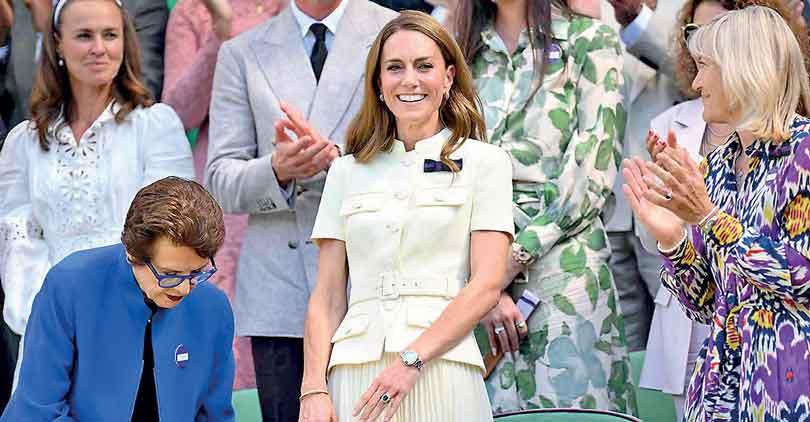
HRH Catherine, Princess of Wales

Iga Świątek and Amanda Anisimova
The result was historically significant, not only for its rarity at Wimbledon, but for being just the third time in Grand Slam history that a women’s final ended 6–0, 6–0, following Steffi Graf’s win over Natasha Zvereva at Roland Garros in 1988
On Saturday, July 12, 2025, Polish tennis sensation Iga Świątek captured her first Wimbledon title, and her sixth Grand Slam crown overall, with an astonishing 6–0, 6–0 victory over American Amanda Anisimova. The match, lasting just 57 minutes, marked the first “double bagel” in a Wimbledon women’s final since 1911.
A Performance for the Ages
Świątek’s display of dominance on Centre Court was nothing short of extraordinary. She did not concede a single game, demonstrating flawless precision, athleticism, and unwavering focus. Her dismantling of Anisimova’s game was swift and surgical, leaving spectators stunned by the sheer level of her control. The result was historically significant, not only for its rarity at Wimbledon, but for being just the third time in Grand Slam history that a women’s final ended 6–0, 6–0, following Steffi Graf’s win over Natasha Zvereva at Roland Garros in 1988.
Road to Glory and Career Milestones
Although long dominant on clay, Świątek had previously struggled on grass courts, making her triumph at SW19 especially remarkable. Until this year, she had never advanced past the junior final at Wimbledon. With this win, she joins an elite group of women who have won Grand Slam titles on clay, hard, and grass surfaces. Her perfect 6–0 record in Grand Slam finals matches Monica Seles, trailing only Roger Federer’s 7–0 in the Open Era. The win also brings her a £3 million prize and cements her status as the first Polish woman to lift the Venus Rosewater Dish in the Open Era.
Amanda Anisimova’s Day of Reckoning
Though the loss was punishing, it capped a courageous comeback story for Amanda Anisimova, who had returned to the tour after a mental-health break to reach her first Grand Slam final. The moment appeared overwhelming, she struggled to find her rhythm and was visibly affected by the occasion. Her tears during the trophy ceremony, where she was comforted by HRH Catherine, Princess of Wales, reflected both heartbreak and resilience. Despite the defeat, Anisimova’s gracious post-match comments, thanking her family and calling Świątek “incredible” and “an inspiration,” won admiration for her sportsmanship and emotional maturity.
Reaction, Reflection and Legacy
Świątek described the victory as “pretty surreal” and voiced excitement for future battles with Anisimova. Many observers noted the disbelief in the crowd at Centre Court, watching a player once seen as a clay-court specialist deliver such a masterclass on grass. Her performance didn’t just make history; it shifted perceptions. At just 24 years old, Świątek is not only building a formidable legacy but also redefining the current era of women’s tennis.











